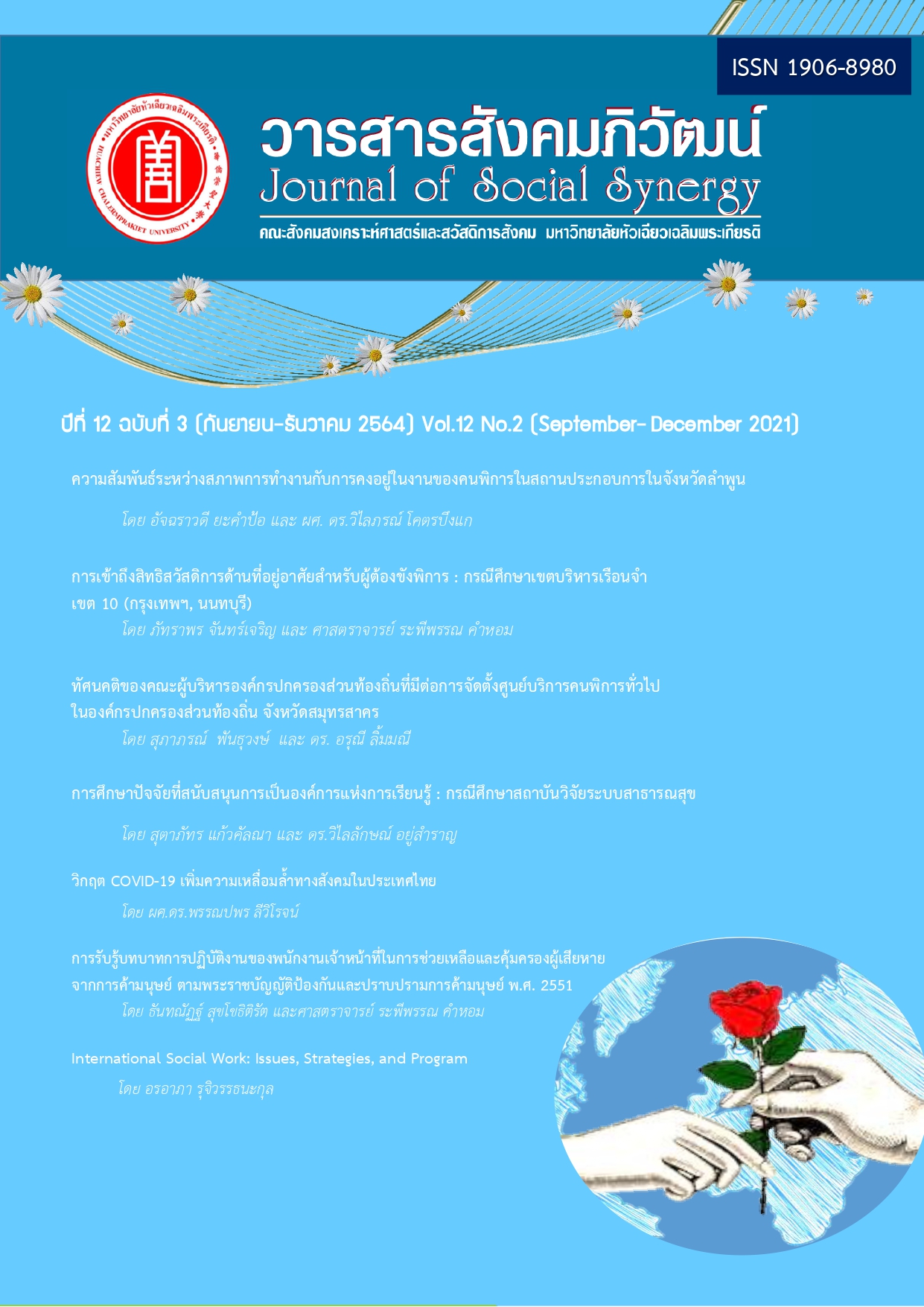The COVID-19 crisis has greatly increased social inequality.
Keywords:
Social Inequality, COVID-19, Crisis in ThailandAbstract
Social inequality in Thailand has long been a chronic and potentially more serious issue following the COVID-19 crisis, especially the poor or socially vulnerable most affected by the lack of income from Lock down measures and shutdowns of small and medium businesses. This increases the gap between the poor and the rich, such as employment, income, health, and education. However, this crisis can be a great opportunity for social work. As it has made civil society more focused on the problem of inequality and see more of the gaps in the state welfare system that help achieve a change in the direction that facilitates the advocacy of policies and measures to address social inequality problems for attaining the strategy of creating fairness and reducing inequality over the next 5 years.
References
หลังยุคโควิด 19. ค้นคืนจาก https://www.nesdc.go.th/download/document/Macroseminar/
กิตติพงษ์ กิตยารักษ์. (2563). หลัง COVID-19 จะมี “คนจนใหม่” เพิ่ม 11 ล้านคน. ค้นคืนจาก
https://news.thaipbs.or.th/content/292046
กรมควบคุมโรค กระทรวงสาธารณสุข. (2563). รายงานสถานการณ์โรคติดเชื้อไวรัสโคโรนา. ค้นคืนจาก
https://ddc.moph.go.th/viralpneumonia/situation.php
มหาวิทยาลัยมหิดล. (2563). ความรู้พื้นฐาน COVID - 19 การติดเชื้ออการป่วย การดูแลรักษา การป้องกันการ
แพร่เชื้อและการติดเชื้อ. กรุงเทพมหานคร: มหาวิทยาลัยมหิดล.
รพีพัฒน์ อิงคสิทธิ์, (2563). คนผิวดำ, โควิด-19, คนจน. ค้นคืนจาก https://themomentum.co/poor-and-
black-dying-of-covid-19/
สำนักงานคณะกรรมการส่งเสริมวิทยาศาสตร์ วิจัยและนวัตกรรม (สกสว.). (2563). ศึกษาผลกระทบ
ทางสังคมและเศรษฐกิจจากสถานการณ์การระบาดของโควิด-19: กลไกการรับมือและมาตรการช่วยเหลือ. ค้นคืนจาก https://techsauce.co/pr-news/how-to-cope-with-inequality-gap-in-thailand
สำนักงานสภาพัฒนาการเศรษฐกิจและสังคมแห่งชาติ. (2563). แผนการฟื้นฟูเศรษฐกิจและสังคมจากผลกระทบ
ของไวรัสโควิด-19. ค้นคืนจาก http://thaime.nesdc.go.th
สถาบันวิจัยเพื่อการพัฒนาประเทศไทย (ทีดีอาร์ไอ). (2563). การจัดการความเหลื่อมล้ำจากวิกฤตโควิด. ค้นคืน
จาก https://tdri.or.th/2020/10/inequalities-in-the-time-of-covid-19/
สำนักงานคณะกรรมการพัฒนาการเศรษฐกิจและสังคมแห่งชาติ. (2560). รายงานการวิเคราะห์สถานการณ์ความ
ยากจนและความเหลื่อมล้ำในประเทศไทย ปี 2559. ค้นคืนจาก https://tdri.or.th/2020/05/who–are–affected–by–covid-19/
สำนักงานสภาพัฒนาเศรษฐกิจและสังคมแห่งชาติ. (2564). ภาวะสังคมไทย ไตรมาส 4. ค้นคืนจาก
http://social.nesdc.go.th/
องค์การสหประชาชาติประเทศไทย. (2563). การประกอบอาชีพและรายได้ ชี้ผลกระทบจากวิกฤตโควิด-19 ส่งผล
ต่อเป้าหมายการพัฒนาที่ยั่งยืนของไทย. ค้นคืนจาก https://www.un.or.th/publications/
IIED (International Institute for Environment and Development). (2016). The green climate fund
accreditation process: Barrier or opportunity, sustainable development goals (SDGs) and
post-2015 agenda. Retrieved from www.iied.org.
ThaiPublica. (2021). เจาะลึกความเหลื่อมล้ำไทย แก้ได้ไหม แก้อย่างไร. ค้นคืนจาก https://thaipublica.org
/2021/04/kkp-research27/
สำานักงานสภาพัฒนาการเศรษฐกิจและสังคมแห่งชาติ. ภาวะสังคมไทย ไตรมาสสอง ปี 2563.) ค้นคืนจาก
https://www.nesdc.go.th/main.php?filename=socialoutlook_report
Downloads
Published
How to Cite
Issue
Section
License
บทความที่ได้รับการตีพิมพ์เป็นลิขสิทธิ์ของวารสารสังคมภิวัฒน์ มหาวิทยาลัยหัวเฉียวเฉลิมพระเกียรติ
ข้อความที่ปรากฏในบทความแต่ละเรื่องในวารสารวิชาการเล่มนี้เป็นความคิดเห็นส่วนตัวของผู้เขียนแต่ละท่านไม่เกี่ยวข้องกับมหาวิทยาลัยหัวเฉียวเฉลิมพระเกียรติ และคณาจารย์ท่านอื่นๆในมหาวิทยาลัยฯ แต่อย่างใด ความรับผิดชอบองค์ประกอบทั้งหมดของบทความแต่ละเรื่องเป็นของผู้เขียนแต่ละท่าน หากมีความผิดพลาดใดๆ ผู้เขียนแต่ละท่านจะรับผิดชอบบทความของตนเองแต่ผู้เดียว




